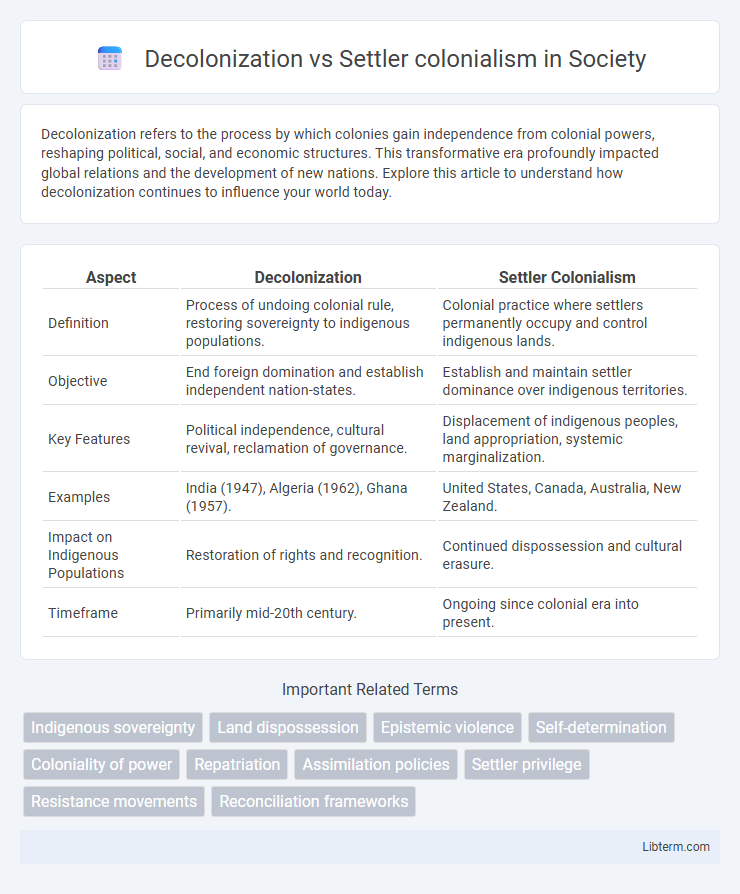Decolonization refers to the process by which colonies gain independence from colonial powers, reshaping political, social, and economic structures. This transformative era profoundly impacted global relations and the development of new nations. Explore this article to understand how decolonization continues to influence your world today.
Table of Comparison
| Aspect | Decolonization | Settler Colonialism |
|---|---|---|
| Definition | Process of undoing colonial rule, restoring sovereignty to indigenous populations. | Colonial practice where settlers permanently occupy and control indigenous lands. |
| Objective | End foreign domination and establish independent nation-states. | Establish and maintain settler dominance over indigenous territories. |
| Key Features | Political independence, cultural revival, reclamation of governance. | Displacement of indigenous peoples, land appropriation, systemic marginalization. |
| Examples | India (1947), Algeria (1962), Ghana (1957). | United States, Canada, Australia, New Zealand. |
| Impact on Indigenous Populations | Restoration of rights and recognition. | Continued dispossession and cultural erasure. |
| Timeframe | Primarily mid-20th century. | Ongoing since colonial era into present. |
Understanding Decolonization: Definitions and Goals
Decolonization refers to the process by which colonized nations or peoples achieve political independence and reclaim sovereignty from colonial powers, aiming to restore cultural identity, social structures, and economic autonomy. Settler colonialism differs by establishing a permanent settler population that seeks to replace indigenous populations and maintain ongoing control rather than simple extraction or governance. Understanding decolonization involves recognizing its goals of dismantling colonial systems, addressing historical injustices, and fostering self-determination for indigenous and marginalized communities.
Settler Colonialism Explained: Key Characteristics
Settler colonialism involves the permanent occupation and replacement of indigenous populations by settlers who establish new political and social structures. Key characteristics include land dispossession, the erasure of indigenous cultures, and the establishment of settler sovereignty through laws and institutions. This form of colonialism differs from other colonial practices by prioritizing settler presence and dominance rather than temporary exploitation.
Historical Context: Roots of Settler Colonialism
Settler colonialism originated during European expansion in the 15th and 16th centuries, characterized by settlers seeking to replace indigenous populations rather than merely exploit resources. Unlike traditional colonialism, which often extracted wealth while maintaining native social structures, settler colonialism aimed for land acquisition and cultural domination. This historical context reveals how indigenous dispossession and systemic violence became central strategies for establishing settler societies.
Decolonization Movements Across the Globe
Decolonization movements across the globe fundamentally challenged settler colonialism by demanding sovereignty and the dismantling of imposed political structures. Key examples include India's independence in 1947, Algeria's liberation in 1962, and the anti-apartheid struggle in South Africa culminating in 1994. These movements emphasized reclaiming indigenous cultural identity, land rights, and political autonomy from settler colonial regimes.
Indigenous Resistance to Settler Colonial Structures
Indigenous resistance to settler colonial structures manifests through efforts to reclaim land, preserve cultural practices, and assert sovereignty against ongoing displacement and assimilation policies. Decolonization challenges the legitimacy of settler colonialism by addressing systemic inequalities embedded in legal, political, and social frameworks imposed by colonial powers. These acts of resistance include grassroots movements, legal battles, and the revitalization of Indigenous languages and traditions as fundamental strategies to dismantle settler colonial dominance.
The Ongoing Impact of Settler Colonialism
Settler colonialism continues to shape social, economic, and political structures by entrenching systemic inequalities and dispossessing Indigenous peoples of land and resources. Persistent policies and practices rooted in settler colonial frameworks undermine Indigenous sovereignty and cultural survival, leading to ongoing struggles for land rights and self-determination. The enduring impact of settler colonialism manifests in continued resistance efforts, legal battles, and movements advocating for decolonization and reparative justice worldwide.
Decolonization vs. Postcolonialism: Key Differences
Decolonization refers to the active process of dismantling colonial rule and restoring autonomy to indigenous populations, whereas postcolonialism is an academic framework analyzing the cultural, political, and economic legacies left by colonialism. Decolonization involves tangible political actions and systemic changes, while postcolonialism primarily critiques and interprets the ongoing effects of colonial dominance in literature, identity, and society. Key distinctions lie in decolonization's emphasis on sovereignty restoration and postcolonialism's focus on theoretical discourse and representation.
Cultural Revitalization in Decolonization Efforts
Cultural revitalization in decolonization efforts centers on reclaiming Indigenous languages, traditions, and spiritual practices suppressed by settler colonialism. These initiatives counteract settler colonialism's aim to erase Indigenous identity by restoring ancestral knowledge and strengthening community cohesion. Empowering Indigenous peoples through cultural resurgence fosters sovereignty and resilience against ongoing colonial structures.
Legal and Political Challenges to Settler Colonialism
Settler colonialism faces profound legal and political challenges as Indigenous populations seek recognition of sovereignty, land rights, and reparative justice through international law frameworks such as the United Nations Declaration on the Rights of Indigenous Peoples (UNDRIP). Courts and political institutions often grapple with historical treaties' validity, land restitution claims, and the dismantling of colonial legal structures that perpetuate settler dominance. Decolonization efforts demand transformative policy reforms to replace settler-state governance with Indigenous self-determination, confronting entrenched systems of property rights and jurisdictional authority.
Pathways Toward Justice and Reconciliation
Decolonization involves dismantling settler colonial structures and restoring sovereignty to Indigenous peoples, emphasizing land restitution, legal recognition, and cultural revitalization. Settler colonialism perpetuates systems of displacement and erasure, requiring pathways toward justice that include truth-telling, reparations, and institutional reform. Effective reconciliation processes prioritize Indigenous leadership, address historical traumas, and establish equitable frameworks for coexistence and self-determination.
Decolonization Infographic

 libterm.com
libterm.com